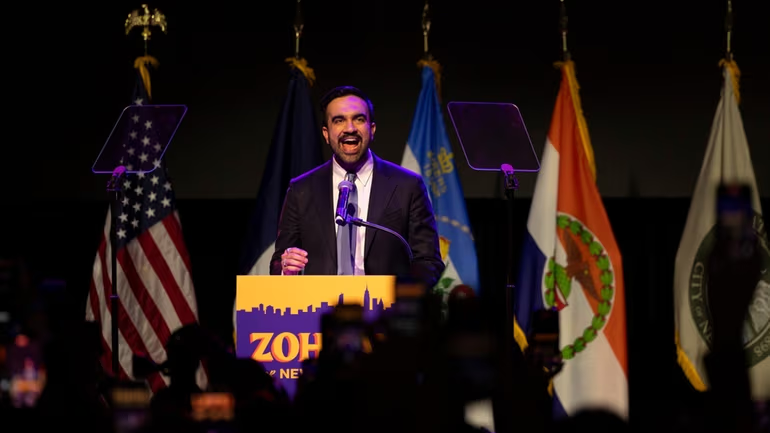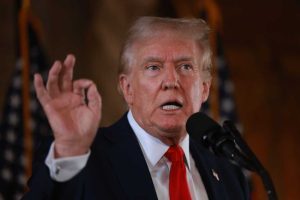Zohran Mamdani has made history in New York City. At just 34 years old, Mamdani has secured his place as the youngest person in a century to win the mayoral race. In addition to his youth, he is also the first Muslim and first South Asian candidate ever elected Mayor of New York City. His victory is not only political—it marks a dramatic cultural shift in America’s largest city.
Reports say Mamdani won with 50.4% of the vote, narrowly defeating two well-known competitors: Andrew Cuomo, the former governor, who earned 41.6%, and Curtis Sliwa, a right-wing activist and radio personality, who managed just 7%. The election results have surprised and energized many across the city and beyond, with some media calling it a turning point in New York’s political identity.
Mamdani, a self-identified Democratic socialist, ran on a bold platform pushing ideas many said were too ambitious for mainstream politics. Among his policy goals are a universal childcare program available to all New Yorkers, major investments in public transport—including his eye-catching proposal to make city buses “fast and free”—and significant tax increases on the wealthiest residents of the city. Progressive organizations and grassroots groups stood firmly behind his vision, praising his focus on working-class and immigrant communities.
Still, his campaign drew fierce criticism, most notably from President Donald Trump. In the weeks leading up to the election, Trump made it clear he opposed Mamdani’s candidacy, publicly urging New Yorkers to vote instead for Andrew Cuomo. In an interview on “60 Minutes,” Trump said, “Whether you personally like Andrew Cuomo or not, you really have no choice. You must vote for him, and hope he does a fantastic job. He is capable of it, Mamdani is not!”
Trump also dangled a financial threat over New York City, suggesting he might withhold federal funds if Mamdani were to be elected. It was a striking intervention—critics called it undemocratic and a form of political bullying, while supporters of Trump claimed it was simply a warning against “radical socialism.”
When Mamdani finally stepped up to the podium on election night, he did not shy away from the confrontation. Addressing a large, passionate crowd of supporters, he celebrated the win as a victory for people from “all corners of the city who never believed someone like them could lead it.”
“New York has spoken in a clear voice,” he said, beaming. “Hope is alive.”
The crowd cheered as Mamdani introduced himself not just as mayor-elect, but as someone whose identity had been used against him throughout the race: “I am young. I am Muslim. I am a democratic socialist. And most damning of all,” he added with a grin, “I refuse to apologize for any of this.”
His words were received with applause, but it was what he said next that instantly took over headlines.
Reflecting on Trump’s criticisms and ominous predictions, Mamdani spoke directly to the President, delivering the moment everyone would soon be talking about: “If anyone can show a nation betrayed by Donald Trump how to defeat him, it is the city that gave rise to him. This is not only how we stop Trump. It’s how we stop the next one.”
Then came the four words that echoed across social media: “Turn the volume up.”
Those words, sharp and symbolic, stood out as a rallying cry for resistance—for cities like New York that are often in Trump’s crosshairs, politically and rhetorically. They were also a reminder of Trump’s own showmanship, turning his phrase about volume into a weapon of defiance.
But Mamdani didn’t stop there. In the rest of his speech, he condemned what he called the “oligarchy and authoritarianism” that had taken hold in American politics, drawing a direct line from Trump to other elites who he said “profited off the suffering of working families.”
He called out real estate magnates—Trump included—accusing them of “taking advantage of their tenants and evading responsibility with the help of corrupt lawmakers.” He promised to hold “bad landlords” accountable and to close the loopholes that allowed the ultra-rich to avoid paying their share in taxes.
“We will put an end,” Mamdani declared, “to the culture of corruption that has allowed billionaires like Trump to evade taxation and exploit tax breaks.”
He further vowed to expand labor protections and support unions, arguing that when “working people have ironclad rights, the bosses who seek to extort them become very small indeed.”
Ending on a note of unity and defiance, Mamdani embraced his identity as an immigrant in a city built by immigrants: “New York will remain a city of immigrants, a city powered by immigrants and as of tonight, led by an immigrant.”
“So hear me, President Trump,” he said in a final flourish of rhetoric that brought the crowd to its feet. “To get to any of us, you will have to get through all of us.”
Trump, for his part, wasted no time responding. Within hours of Mamdani’s speech, Trump posted on Truth Social: “…AND SO IT BEGINS!” The post was brief but unmistakably suggestive of a larger political battle brewing—one that could echo well into the next election year.
What comes next for Mamdani is now the city’s biggest question. His term officially begins on January 1, when he will be sworn into office amid great expectations and even greater scrutiny. His supporters believe he can deliver transformative change, while his critics argue that his proposals are impractical or financially unsustainable.
But for Mamdani, who built his campaign on the belief that politics should be rooted in community, compassion, and courage, the victory speech wasn’t just a celebration—it was a promise. A promise that his values will guide him through challenges. A promise that he won’t back down, not even when the country’s most polarizing figure comes after him.
Most importantly, it was a promise that he will fight—not just for the New Yorkers who voted for him, but for all of them. “This is what our victory means,” he said. “It means that no matter how powerful they think they are, we are powerful enough to stand together and hold them to account.”
And with that, New York’s newest mayor closed out his speech, not with fear, but with confidence—with the certainty of someone who knows he has made history, and someone who is determined to make the most of it.
Only time will tell how his tenure unfolds, but one thing is already clear: Zohran Mamdani has arrived, and he’s not planning to stay quiet.

Emily Johnson is a critically acclaimed essayist and novelist known for her thought-provoking works centered on feminism, women’s rights, and modern relationships. Born and raised in Portland, Oregon, Emily grew up with a deep love of books, often spending her afternoons at her local library. She went on to study literature and gender studies at UCLA, where she became deeply involved in activism and began publishing essays in campus journals. Her debut essay collection, Voices Unbound, struck a chord with readers nationwide for its fearless exploration of gender dynamics, identity, and the challenges faced by women in contemporary society. Emily later transitioned into fiction, writing novels that balance compelling storytelling with social commentary. Her protagonists are often strong, multidimensional women navigating love, ambition, and the struggles of everyday life, making her a favorite among readers who crave authentic, relatable narratives. Critics praise her ability to merge personal intimacy with universal themes. Off the page, Emily is an advocate for women in publishing, leading workshops that encourage young female writers to embrace their voices. She lives in Seattle with her partner and two rescue cats, where she continues to write, teach, and inspire a new generation of storytellers.









